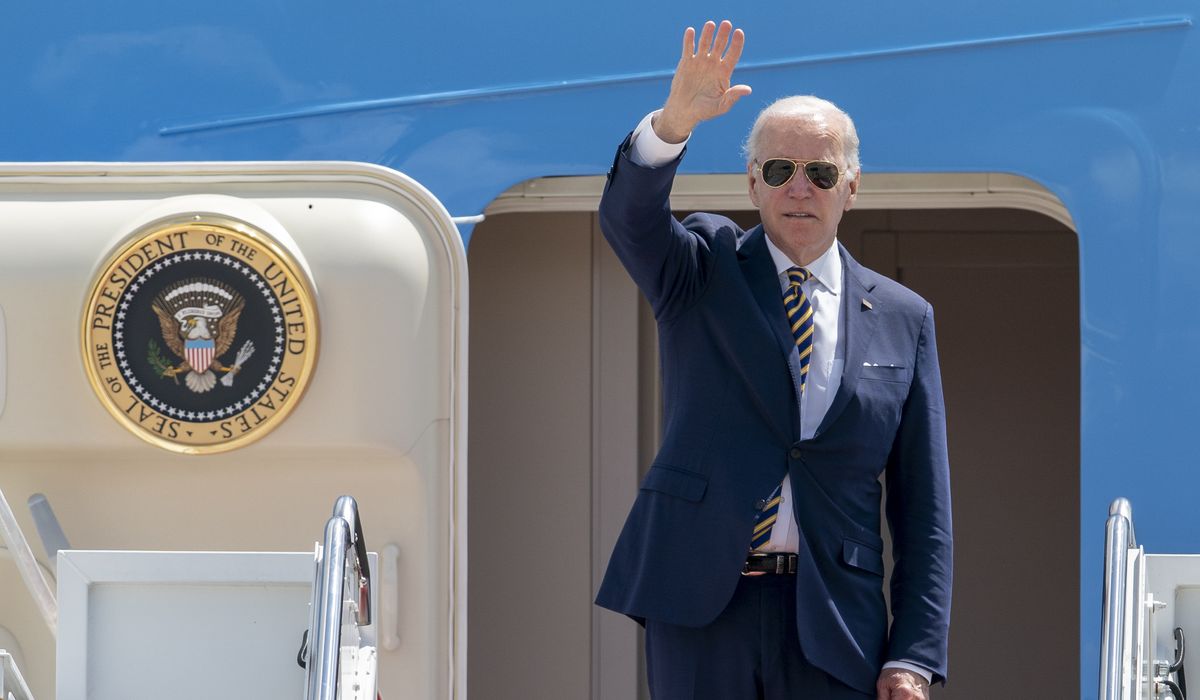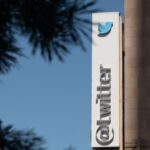
President Biden will attempt to project harmony and unity of purpose among Indo-Pacific democracies and underscore America’s security commitment to Asia during a six-day trip to South Korea and Japan amid pre-trip criticism from a wary China and concerns that North Korea may try to derail the trip with a nuclear test.
While conservative analysts say Mr. Biden lacks a robust enough economic plan to draw U.S. allies away from China’s dominant trade orbit — Beijing is now the top trading partner for Japan, South Korea and many others in Asia — administration officials say the president’s itinerary has been crafted to send a key “message” to Beijing.
The trip coincides with rising international unease over Russia’s war in Ukraine, a situation Mr. Biden will likely try to exploit, if only to convey a collective regional message that the faltering Russian invasion should give China pause over its own saber-rattling in the Pacific, including toward Taiwan.
In addition to meeting just-elected South Korean President Yoon Suk Yeol and conferring with Japanese Prime Minister Fumio Kishida, the diplomatic centerpiece of Mr. Biden’s trip is slated to occur next week in Tokyo, when the president will meet with fellow leaders of the Indo-Pacific strategic grouping known as the Quad, a collection of the region’s most powerful democracies that includes Australia, India and Japan that China sees as expressly designed to contain its regional ambitions.
National Security Adviser Jake Sullivan predicted the trip, the first to Asia of the Biden presidency, will “show in living color the United States can at once lead the free world in responding to Russia’s war in Ukraine, and that at the same time chart a course for effective, principled American leadership and engagement in a region that will define much of the future of the 21st century.”
“The message we’re trying to send on this trip is a message of an affirmative vision of what the world can look like if the democracies and open societies of the world stand together to shape the rules of the road, to define the security architecture of the region, to reinforce strong, powerful, historic alliances,” Mr. Sullivan said. “We think that message will be heard everywhere,” he told reporters at the White House. “We think it will be heard in Beijing.”
SEE ALSO: China steps up subversion of global order in power grab, U.S. Pacific admiral warns
Mr. Sullivan also confirmed Mr. Biden will use the trip to formally announce plans for an “Indo-Pacific Economic Framework,” a pact to cement regional rules for trade and digital standards, worker protections and decarbonization, as well as tax and anti-corruption issues. Washington is playing catch-up, analysts say, after declining to join a free-trade pact of Pacific Rim countries that the Obama administration negotiated but that President Trump and now Mr. Biden refused to embrace.
Some regional analysts say the Biden trip is well-timed, coming at a moment when China is on its heels dealing with internal and external crises. “The Chinese are in a strategic low tide right now,” said Yun Sun, who heads the China Program at the Stimson Center in Washington.
She pointed to Beijing’s “unwise” policy of having aligned with Russia prior to its invasion of Ukraine, and domestic friction stemming from ongoing COVID-19 lockdowns and economic headwinds. Mr. Biden’s trip has already caught the attention of top leaders in Beijing, with Chinese Foreign Minister Wang yi complaining in a call Wednesday with Japanese counterpart Yoshimasa Hayashi about what he said was anti-China rhetoric coming from both Tokyo and Washington in recent days.
“Most of all, Chinese President Xi Jinping has not left the country for more than two years, so leadership diplomacy for China itself is a no-go at the moment,” said Ms. Yun. “China is so bogged down with domestic struggles and problems, this is the perfect opportunity for the United States to capitalize and launch a charm offensive in Asia, and consolidate and reinforce our alliances and partnerships.”
Others are less optimistic.
James Carafano, a longtime foreign policy and national security expert with the Heritage Foundation, said the administration is kidding itself if it thinks regional countries are poised to embrace any U.S.-driven economic pact that doesn’t clearly present opportunities that are more profitable than trading with China.
SEE ALSO: Biden admin warns about North Koreans infiltrating tech sector
President Biden “isn’t really bringing anything to the table, particularly on trade which is their top issue,” said Mr. Carafano, who expressed skepticism over IPEF.
“I anticipate this will be a nothingburger with a side of nothing,” he said.
Walter Lohman, who heads the Asian Studies Center at Heritage, added that while China may be in a low moment, it remains “focused on the long term” in ways the U.S. is not.
“This is something Washington has an increasingly difficult time doing. Visiting allies in Japan and South Korea is the least a U.S. president can do. [We] need to do that to just tread water. And honestly, that’s all the Biden administration is doing right now – treading water.” he said. “We’re cutting ships from our Navy’s budget. And we’re not presenting China’s neighbors an attractive economic alternative to their growing engagement with China.”
North Korea threatens
Mr. Biden arrives in the midst of an unfolding crisis in North Korea, where health exerts say a mass COVID-19 outbreak appears to be spreading through its unvaccinated population.
In recent months, North Korea has also re-started a program of increasingly powerful missile tests in what experts see as an attempt to modernize its weapons and pressure its rivals to accept the country as a nuclear state and relax their sanctions.
Mr. Sullivan told reporters that U.S. intelligence officials had determined there’s a “genuine possibility” that the regime of North Korean leader Kim Jong Un will conduct a new ballistic missile test or even a nuclear weapons test during Mr. Biden’s Asia visit.
Concern is high such a test could occur while Mr. Biden is in Seoul on Friday and Saturday for meetings with South Korea’s Mr. Yoon, a conservative who narrowly won election in March.
Analysts predict South Korea could tilt closer to the U.S. under Mr. Yoon, who took office this month and has pledged to pursue stronger security ties with Washington to neutralize North Korea’s nuclear threats. The new South Korean president has also criticized predecessor Moon Jae-in as “subservient” to China.
Mr. Biden will head to Japan on Sunday where he’ll meet with Japanese Prime Minister Fumio Kishida.
But even as Mr. Biden is to be feted by Mr. Yoon at a state dinner and talks with with Mr. Kishida, the U.S. president knows those relationships need to be deepened if they are to serve as a counterweight to China’s ambitions, in particular with regards to Taiwan.
Ms. Yun suggested that foreign policy observers should be watching to see whether any joint statements emerge from Mr. Biden’s meetings that make specific reference to solidarity with Taiwan, an island democracy that the ruling Communist Party in Beijing claims is within China’s sovereignty. Concerns are running high that China is moving inexorably closer to military action against Taiwan.
She noted that joint leaders’ statements issued last year during separate visits to the White House by the former South Korean president and the former Japanese prime minister had broken ground on the matter by stressing the importance of preserving peace and stability across the Taiwan Strait.
“The fact that we can even mention Taiwan — that’s a big deal and it puts China in an uncomfortable spot,” she told The Times.
Focus on the Quad
China warned ahead of Mr. Biden’s trip that already tense relations between Washington and Beijing will worsen dramatically if U.S. officials try and play the “Taiwan card” while the president is visiting South Korea and Japan. Yang Jiechi, the leading foreign policy official on China’s Politburo, cautioned Mr. Sullivan on the issue in a phone call this week, according to a Chinese government readout of the call.
“If the U.S. side persists in playing the ‘Taiwan card’ and goes further down the wrong path, it will surely put the situation in serious jeopardy,” the readout said. “We urge the U.S. side to get a clear understanding of the situation, strictly honor its commitments and abide by the one-China principle.”
China’s expanding military and economic muscle-flexing in general are expected to be on the agenda during Tuesday’s Quad meeting in Tokyo, where Mr. Biden will gather with Mr. Kishida, Indian Prime Minister Narendra Modi, and either Prime Minister Scott Morrison or current opposition leader Anthony Albanese — depending on who wins Saturday’s Australian general election.
Mr. Biden hosted the first-ever in-person summit of leaders of the Quad countries last year, in a sign of growing momentum behind what began as a Trump-era push to rally Asia’s most powerful democracies into a more formal grouping to confront and contain China.
The September summit dovetailed with the separate announcement of a U.S.-Australian-U.K. security pact that many see as a parallel effort to counter China. The administration’s embrace of the pact and promotion of the Quad underscore what analysts say is an accelerating U.S. shift in focus toward the Indo-Pacific region after decades of war and focus on terrorist groups in the Middle East and Afghanistan.
However, Mr. Biden’s critics say the president has barely scratched the surface of what Washington should be doing if it truly wants to compete with a rising China on the regional and global stage.
Mr. Lohman, specifically, said the administration has racked up “big misses” by cutting ships from the U.S. Navy’s budget and failing to present China’s neighbors with attractive economic alternatives to trade with Beijing.
“A big summit in Washington, a tour through Japan and South Korea and a half-baked, domestically focused economic framework, even the administration’s welcomed commitment to the Quad, doesn’t make up for these big misses,” he told The Times. “At some point, you’ve got to ask yourself: Is the U.S. even serious about this competition with China? So much noise. Very little action, including from the Hill, where it matters most.”







